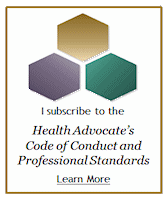
As private, independent health advocates are very aware, there is no nationally (or internationally) recognized certification for our profession. As such, there is no recognized – or expected – set of behaviors or standards for our profession either.
What exactly does that mean, and why does it matter?
Let’s put ourselves in our potential clients’ shoes for a moment.
With no rules and no set of expectations – what makes potential clients think they can trust us? They find an advocate’s name online, talk to them on the phone for a few minutes, and – what? Send them money? Put their faith, health (and possibly their lives) in that advocate’s hands? Based on what?
When a patient goes to the doctor, that doctor has a list of credentials that at least say “OK – this doctor went to school, passed tests, and probably knows the stuff you need him or her to know.” Those credentials include degrees, certifications and licenses. The same is true for many other service providers – from realtors to teachers to hairdressers….
But not health or patient advocates or navigators. Granted – those advocates and navigators who have nursing or physician backgrounds have a good start. But still… no nationally recognized set of standards for the profession of health advocacy.
So to move the profession forward, a committee of well-respected private advocates* has helped to develop a Health Advocates’ Code of Conduct and Professional Standards – one YOU, as an advocate of any flavor, are invited to subscribe to. Private advocates, hospital advocates, insurance advocates – if you work as a health advocate, you are invited to subscribe.
The intent is not to suggest this is a nationally recognized code. It’s not. Instead, it’s a set of concepts that individual advocates can point to – publicly – to say “I BELIEVE IN THIS CODE AND THESE STANDARDS AND WILL CONDUCT MY ADVOCACY WORK ACCORDINGLY.” It provides the opportunity to make such a statement on your website, your printed marketing materials, in the materials you hand off to your potential clients, and more. It helps your clients and potential clients know they can trust you to act in their best interests because you have publicly stated so.
For those of you who are members of NAHAC, and have agreed to its Code of Ethics – this is an additional way to make your intentions known, in a more public forum. It does not eclipse the good work being done at NAHAC. If anything, the intention is to reinforce that good work.
For those of you who are not members of NAHAC – now you have a code you can subscribe to. It’s simply a way to let the world know that you are a person of integrity.
Here’s a link to the website for The Health Advocate’s Code of Conduct and Professional Standards. Read them, and subscribe to them. Your name will be added to the site.
We’ll show the world of patients that our focus on integrity for the profession of health advocacy.
*With thanks to Amy Cuykendall, Ida Schnipper, Dr. Steven Kussin and Crystal Fornes.
? ? ? ? ? ? LEARN MORE ? ? ? ? ? ?
FOR PATIENTS | FOR ADVOCATES | FOR POTENTIAL ADVOCATES
? ? ? ? ? ? ? ? ? ? ? ?




